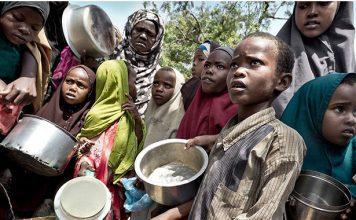A recent report from the United Nations Children’s Fund discloses that globally, 181 million children under five years old, which constitutes one out of every four children, are afflicted by severe child food deprivation during early childhood.
The report indicates that 65% of these 181 million children are located in 20 nations, with 64 million in South Asia and 59 million in Sub-Saharan Africa.
Under the title “Child Food Poverty: Nutrition Deprivation in Early Childhood,” the study exposes that the global food and nutrition crisis, along with conflicts and climate change, is exacerbating child food deprivation.
Furthermore, it stresses that while children in volatile regions and impoverished households bear the brunt, even children born in non-poor homes are impacted.
In its definition, UNICEF characterizes child food poverty as the incapacity of children to access and consume a nutritious and varied diet during early childhood.
The report emphasizes the detrimental effects of child food poverty during early childhood, underscoring how inadequate intake of essential nutrients can jeopardize child survival, physical growth, and cognitive development.
UNICEF also alerts that child food deprivation contributes to child undernutrition and is poised to escalate child stunting.
According to the World Health Organization, stunting occurs when a child, owing to chronic or recurrent malnutrition, is too short for their age, leading to increased child mortality and impaired physical and cognitive growth.
In a report by Wakadaily, it is revealed that the National Food Consumption and Micronutrient Survey discloses that 33% of Nigerian children under five years old suffer from stunted growth.
UNICEF identifies Nigeria as the second-largest bearer of stunted children worldwide, with 12 million out of the 35 million children under five experiencing stunting due to malnutrition.
Additionally, about two million children endure severe acute malnutrition, with only two of every ten afflicted children receiving treatment.
UNICEF identifies several factors contributing to this crisis, including,food systems that fail to provide children with nutritious, safe and accessible options, families’ inability to afford nutritious foods, and parent’s inability to adopt and sustain positive child feeding practices.”
UNICEF urges increased efforts to address child food poverty, essential for achieving global and national goals in nutrition and development.
The organization appeals to governments, partners, donors, civil society, media, and academic institutions to allocate resources to combat child food poverty and promote access to nutritious food for children’s healthy growth and development.
“Transform food systems by ensuring food environments make nutritious, diverse and healthy foods the most accessible, affordable and desirable option for feeding young children, and the food and beverage industry complies with policies to protect children from unhealthy foods and beverages.
“Leverage health systems to deliver essential nutrition services, including counselling and support on child feeding, to prevent and treat child malnutrition, prioritising the most vulnerable children.
“Activate social protection systems to address income poverty in ways that are responsive to the food and nutrition needs of the most vulnerable children and their families, including social transfers to protect children at highest risk of child food poverty.
“Strengthen data systems to assess the prevalence and severity of child food poverty; detect increases in child food poverty early, including in fragile and humanitarian contexts; and track national and global progress in reducing severe child food poverty,” UNICEF mentioned.
